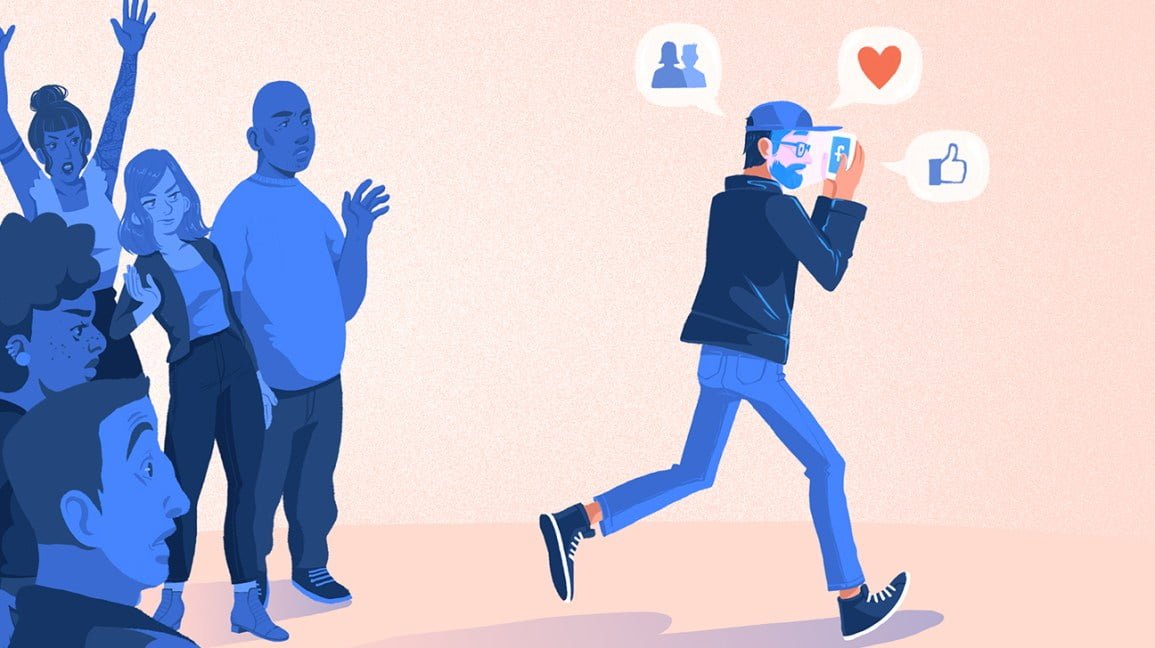
Nobody is a stranger to deep diving into the Facebook rabbit hole. You know the scenario.
For me, it’s a Tuesday night, and I’m unwinding in bed, mindlessly scrolling “just a little,” when half an hour later, I’m no closer to resting.
I’ll comment on a friend’s post and then Facebook suggests friending a former classmate, but instead of doing that, I’ll scroll through their profile and learn about the last few years of their life… until I see an article that sends me down a research spiral and a comment section that leaves my brain on hyperdrive.
The next morning, I wake up feeling drained.
Maybe the blue light that illuminates our faces as we scroll through feeds and friends’ profiles is to blame for disrupting our sleep cycle. Being unrested can explain the grogginess and irritability one has. Or it could be something else.
Maybe, as we tell ourselves that we’re online to stay connected, we’re unknowingly draining our social energy for in-person interactions.
What if every like, heart, and reply we give to someone on the internet is actually taking away from our energy for offline friendships?
While our brains can tell the difference between chatting online and in-person social interaction, it’s unlikely we’ve developed more — or a separate set of — energy just for social media use.
There’s a limit as to how many people we’re truly in touch with and have the energy for.
That even means that the late-night hours spent engaging in conversations with strangers online takes away from the energy we have to care for people we actually know offline.
“It seems we really can only handle about 150 friends, including family members,” says R.I.M. Dunbar, PhD, a professor in the Department of Experimental Psychology at the University of Oxford. He tells Healthline that this “limit is set by the size of our brains.”
According to Dunbar, this is one of the two constraints that determine how many friends we have.
Dunbar and other researchers established this by conducting brain scans, finding that the number of friends we have, offline and online, is related to the size of our neocortex, the part of the brain that manages relationships.
The second constraint is time.
According to data from GlobalWebIndex, people were spending an average of more than 2 hours a day on social media and messaging in 2017. This is half an hour more than in 2012 and likely to continue to increase as time goes on.
“The time you invest in a relationship determines the strength of the relationship,” Dunbar says.
But Dunbar’s recent study, published in 2016, suggests that even though social media allows us to “break through the glass ceiling” of maintaining offline relationships and have larger social networks, it doesn’t overcome our natural capacity for friendships.
Often, within the 150-limit network, we have inner circles or layers that require a certain amount of regular interaction to maintain the friendship, whether that’s grabbing coffee or at least having some type of back-and-forth conversation.
Think about your own social circle and how many of those friends you consider closer than others. Dunbar concludes that each circle requires different amounts of commitment and interaction.
He says we need to interact “at least once a week for the inner core of five intimates, at least once a month for the next layer of 15 best friends, and at least once a year for the main layer of 150 ‘just friends.’”
The exception being family members and relatives, who require less constant interaction to maintain connections.
So what happens if you have a friend or follower number greater than 150 on your social media networks? Dunbar says it’s a meaningless number.
“We are fooling ourselves,” he explains. “You can certainly sign up as many people as you like, but that doesn’t make them friends. All we are doing is signing up people that we would normally think of as acquaintances in the offline world.”
Dunbar says that, just like we do in the face-to-face world, we dedicate the bulk of our interaction on social media to the 15 people closest to us, with about 40 percent of our attention going to our 5 besties and 60 percent to our 15.
This ties into one of the oldest arguments in favor of social media: It might not expand the number of true friendships, but these platforms can help us maintain and strengthen our important bonds.
“Social media provides a very effective way of keeping old friendships going, so we shouldn’t knock it,” Dunbar says.
One of the perks of social media is being able to engage in the milestones of people I don’t live near. I can be a voyeur of everything from precious moments to mundane meals, all while I go about my own daily routine.
But along with the fun, my feeds are also flooded with headlines and heated commentary from my connections and strangers — it’s unavoidable.
Using your energy for extensive social media interaction with strangers may be draining your resources.
After the presidential election, I considered social media an opportunity to bridge the political divide. I crafted what I hoped were respectful political posts about women’s rights and climate change.
It backfired when someone barraged me with uncomfortable direct messages, causing my adrenaline to soar. I had to then question my next steps.
Is engaging a response healthy for me and my friendships?
The last few years have been, no doubt, some of the wildest years for online engagement, turning URL conversations into IRL (in real life) consequences.
From a moral, political, or ethical debate to admissions of #metoo, we’re often angered or feel pressured to chime in — especially as more familiar faces and voices join the opposite side. But at what cost to ourselves — and to others?
“People may feel compelled to express outrage online because they receive positive feedback for doing so,” says M.J. Crockett, a neuroscientist.
In her work, she researches how people express moral outrageTrusted Source on social media and whether their empathy or compassion is different online than in person. A single like or comment may be meant to affirm opinions, but they can also snowball and affect your offline relationships.
Facebook’s research team also asked a similar question: Is social media good or bad for our well-being? Their answer was that spending time was bad, but actively interacting was good.
“Simply broadcasting status updates wasn’t enough; people had to interact one-on-one with others in their network,” David Ginsberg and Moira Burke, researchers at Facebook, report from their newsroom.
They say that “sharing messages, posts, and comments with close friends and reminiscing about past interactions — is linked to improvements in well-being.”
But what happens when these active interactions turn rotten? Even if you don’t unfriend someone over a dispute, the interaction — at the very least — may change your impressions with and of them.
In a Vanity Fair article about the end of the social media era, Nick Bilton wrote: “Years ago, a Facebook executive told me that the biggest reason people unfriend each other is because they disagree on an issue.
The executive jokingly said, ‘Who knows, if this keeps up, maybe we’ll end up with people only having a few friends on Facebook.’”
Also, former Facebook exec Chamanth Palihapitiya made headlines for saying, “I think we have created tools that are ripping apart the social fabric of how society works… [Social media] is eroding the core foundations of how people behave by and between each other.”
“There is some evidence that people are more willing to punish others when interacting via a computer interface than they are when they interact face to face,” Crockett tells us.
Expressing moral outrage can also open up to negative responses in return and from people who may not have much empathy for different opinions. When it comes to engaging in polarizing conversations, you may want to turn online interactions into offline ones.
Crocket mentions “there is also research showing that hearing other people’s voices helps us counteract dehumanization during political debates.”
For those who are passionate about political and social posting and do find enough resolution to continue on social media, take the advice of Celeste Headlee.
Her years of interviewing experience on Georgia Public Radio’s daily talk show “On Second Thought” prompted her to write “We Need to Talk: How to Have Conversations that Matter”and give her TED talk, 10 Ways to Have a Better Conversation.
“Think before you post,” Headlee says. “Before you respond on social media, read the original post at least twice so you’re sure you understand it. Then do a little research on the subject. All of this takes time, so it slows you down, and it also keeps your thoughts in context.”
Autumn Collier, an Atlanta-based social worker who treats patients with problematic social media concerns, agrees. Political posting requires a lot of energy with little return on the investment, she points out.
“It may feel empowering at the time, but then you get caught up in ‘Did they reply?’ and engage in an unhealthy back-and-forth dialogue. It would be more meaningful to put that energy into a cause or writing a letter to your local politicians.”
And sometimes it may just be better to ignore the conversation. Knowing when to step away and go offline can be key for your mental health and maintaining future friendships.
When it comes to staying in touch with friends, it’s also important to know when to engage in face-to-face interaction again.
While Dunbar has praised the benefits of social media, there’s also a growing body of research about the negative effects of social media, such as increasing depression, anxiety, and feelings of loneliness.
These feelings could be attributed to the number of people you follow and engage with, friends or not.
“Social media advertises itself as increasing our connections to each other, but several studies show that people who spend more time on social media are actually more lonely, not less,” says Jean Twenge, author of “iGen: Why Today’s Super-Connected Kids Are Growing Up Less Rebellious, More Tolerant, Less Happy — and Completely Unprepared for Adulthood.”
Her article for The Atlantic, “Have Smartphones Destroyed a Generation?” made waves earlier this year and caused many millennials and post-millennials, to do exactly what can stress people out: Express moral outrage.
But Twenge’s research isn’t unfounded. She has researched the effects of social media use on teenagers, finding that the newest generation is spending less time hanging out with friends and more time interacting online.
This trend has a correlation to findings of teen depression and feelings of disconnect and increased loneliness.
But while none of these studies confirm that there’s causation, there is a feeling of commonality. That feeling has been coined as FOMO, the fear of missing out. But it’s not limited to one generation. Spending time on social media can have the same effect on adults, even the older ones.
FOMO can turn into a vicious cycle of comparison and inaction. Worse, it may cause you to live your “relationships” on social media. Instead of enjoying quality time with friends, significant others, or family, you’re watching stories and Snaps of others with their friends and family.
Instead of engaging in the hobbies that bring you happiness, you’re watching others engage in hobbies we wish we could. This activity of “hanging out” on social media can result in neglecting friends in all circles.
Remember Dunbar’s study? If we fail to interact with our favorite people regularly, “the quality of the friendships declines inexorably and precipitously,” he says. “Within a couple of months of not seeing someone, they will have slipped down into the next layer.”
“Star Trek” famously opens each episode with this line: “Space: The final frontier.” And while many think of that as the galaxy and stars beyond, it could also refer to the internet.
The World Wide Web has unlimited storage and, like the universe, has no edge or boundaries. But while the limit may not exist for the internet — our energy, bodies, and mind can still tap out.
As Larissa Pham emphatically wrote in a viral tweet: “this AM my therapist reminded me that it’s ok to go offline bc we arent made to process human suffering on this scale, &now i pass it on 2 u” — this tweet has since garnered over 100,000 likes and over 30,000 retweets.
The world is intense right now, even more so when you’re always online. Rather than reading one breaking headline at a time, an average feed will seek our attention with more than enough stories, anything from earthquakes to wholesome dogs to personal accounts.
Many of these are also written to trigger our emotions and keep us clicking and scrolling. But there’s no need to be part of it all the time.
“Be aware that a constant connection to your phone and social media isn’t good for your mental and physical health,” Headlee reminds us. “Treat it the way you would candy or french fries: Don’t gorge.” Social media is a double-edged sword.
Being on your smartphone can drain the energy that could’ve been spent engaging in real-life interactions with your friends or family. Social media is never the prescription for staving off boredom, anxiety, or loneliness. At the end of the day, your favorite people are.
Research shows that good friendships are vital to your health. More specifically, having close friendships correlates to functioning better, especially as we get older.
A recent cross-sectional study of over 270,000 adults found that strains from friendship predicted more chronic illnesses. So don’t keep your friends at arm’s length, locked in your phone and DMs.
“Friends exist to provide us with shoulders to cry on when things fall apart,” Dunbar says. “No matter how sympathetic someone may be on Facebook or even Skype, in the end it is having a real shoulder to cry on that makes the difference to our being able to cope.”
[“source=healthline”]






